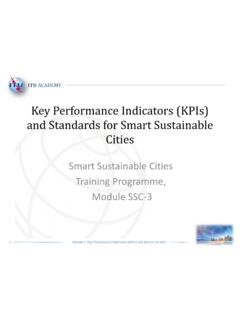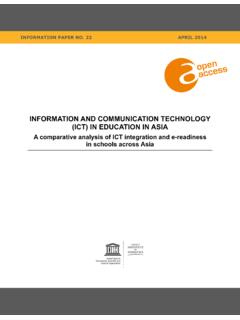Transcription of ICT Policy: A Beginner’s Handbook
1 ICT Policy: A Beginner s HandbookPublished by the Association for Progressive Communications - by Chris NicolMade possible with the support of the Commonwealth Telecommunications Organisation - by the Association for Progressive CommunicationsCopyLeft APC 2003 You are free: to copy, distribute, display this book to make commercial use of this textUnder the following conditions: You must give APC credit For any reuse or distribution, you must make clearto others the license terms of this work Any of these conditions can be waived if you getpermission from the authorIllustration: Matias Bervejillo, Montevideo, UruguayGraphic design: MONOCROMO, Montevideo, UruguayPrinted by: STE Publishers, Johannesburg, South AfricaAddress: PO BOX 29755, Melville 2109, Johannesburg, SouthAfricaISBN: 1-919855-10-6 Website: : published in 2003 This book is available at / 4 Introduction / 5 Part 1.
2 ICT are ICT and internet policies andwhy should we care about them? / 9 Part 2. The internet, markets and basics / economics: What things cost(in different countries) and who pays / structure, monopoliesand multinationals / interconnections and exchanges / differences: Africa, Asia, Europe,USA / infrastructure of the internetand how it shapes governance / models for extending access / and infrastructure: social modelsfor extending the reach of the internet / 46 Part 3. National ICT and internet policyand short history of telecommunicationsreform / policy, legislation and regulation:tools for national development / key players at the national level / actors in international and regionalinternet and ICT policy / and governing the internet / regulation / and regulatory issues / processes / 71 Part 4.
3 Specific issues in internetpolicy and and icts / property / of expression and censorship / and security / and anti-terrorism legislation / / of the right to communicate / 121 Part 5. active in ICT policy / / / 1394 / Association for Progressive CommunicationsInformation and communications are at the heart of humanlife and social development. People have always workedtogether by sharing information and knowledge throughspeech, writing, the printed word and, more recently,telephony and broadcasting. Sharing information empowersindividuals and communities, and enables whole societiesto benefit from the experience of everyone within last decade has seen major changes in our capacityto communicate and share information through newdevelopments in information and communicationstechnology, particularly the Internet.
4 These changes offertremendous new potential for effective communications, buttheir availability and accessibility to citizens and communitiesdepends on decisions made by many people in government,business and civil society - decisions that often seem arcane,technical or specialist but which have profound implicationsfor the future of book aims to guide non-specialists through someof these policy issues and enable its readers to engageeffectively with the decision-making process. It came aboutthrough a partnership developed between the Association forProgressive Communications, the leading international civilsociety group on ICT policy issues, and the CommonwealthTelecommunications Organisations, during my term as theOrganisation s Chief partnership was originally forged in the margins of theDOT Force, the influential multistakeholder forum on ICTsand development involving the G8 and a group of developingcountries in 2000-2002.
5 I am delighted that this particularproduct of multistakeholder partnership is now available andhope that it will prove a valuable tool for all involved in workto make new icts available and valuable for every memberof the world David SouterUniversity of StrathclydeForewordICT Policy: A Beginners' Handbook / 5 Ask a typical citizen about ICT policy and s/he will prob-ably reply with a comment like what s that? or whocares? Getting involved in Information and Commu-nication Technology (ICT) policy-making has not beena priority for most people, even those who are gener-ally active in other areas of public policy.
6 It often seemsremoved from our daily experience, and technicallycomplicated. Yet new communications media are be-coming so important that we cannot continue to ig-nore book takes the mystery out of ICT policy andmakes it easier to understand. Key issues are pre-sented and explained clearly and concisely, and a ba-sis is provided for further investigation. Many concreteexamples are given of recent events or debates, whichthe reader can explore further if so inclined. Havingread it, you will be able to identify the main actors andissues in the field.
7 If you wish to find out more aboutICT policy, you will know where to look for the infor-mation, beginning with the extensive bibliography andlist of organisations active in the field. In short, thisbook aims to build the capacity of interested personsto understand the issues around policy on ICT devel-opment and regulation, to grasp the policy process,and to become involved in it. It is a beginner s hand-book, which can help readers navigate their waythrough the varied terrain of ICT policy. It is not a mapbut a the area of concern includes many kinds of icts ,our interest is centred on the internet.
8 This network ofnetworks is the most innovative and fastest-growingnew technology, and has become vitally important tocontemporary societies. Many of the more traditionalICTs are converging on the internet, using it, becom-ing part of it, and often becoming indistinguishable fromit. The internet is still in its infancy, but powerful forcesare trying to limit the freedom currently enjoyed byinternet users. The future of icts is everyone s busi-ness, and APC would like ICT policy-making to beparticipatory, involve all sectors of society, and to ben-efit all, not just the powerful and the book should thus be of interest to a wide range ofpeople: members of civil society groups, researchers,activists, technical persons who are getting more in-terested in the political side, journalists looking for back-ground information, government-administration work-ers, or anyone else who is interested in the topics.
9 It isnot a technical book, although it tries to explain insimple language some of the technical backgroundknowledge that is necessary in order to be able todiscuss and debate ICT policy first chapter explains what is meant by ICT policy,and why it is important. It locates our interest in ICTsin a historical moment, when it is particularly importantto ensure that the freedoms enjoyed by internet usersare not eroded by restrictive legislation or practices,and that they are extended to all countries and Two looks at what makes the internet differentfrom other media and icts , and seeks to explain whypresent internet use is inequitably distributed.
10 It ex-plains how it is possible that internet access is moreexpensive in the countries whose citizens can leastafford it, and is cheaper for citizens in wealthier coun-tries. It calls for regarding internet access as a socialissue and not merely an economic Three explains policy and regulation, how policyis decided, who the main players are, and what can bedone to ensure that policy decision-making is a trans-parent, participatory process, and not one which in-volves only those with the money and the power toinfluence governments and the Four considers specific themes in ICT policy, againwith a special focus on the internet.








